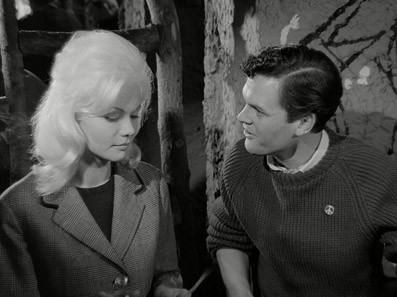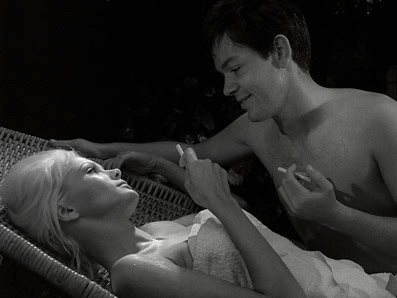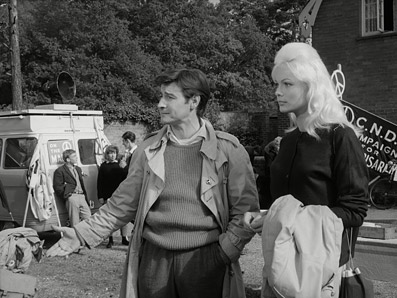|
Sex education in schools, at least in the form that we know it today, was in its infancy when I was a child. Words like Gonorrhoea, Chlamydia and Syphilis were unknown to us and referred to collectively under the acronym VD. We didn't know how you caught VD or even what it meant – for us it was little more than a playground taunt, as in "Ugh! You've got VD!" It was this lack of awareness that was for so long a problem, of course, a self-perpetuating cycle in which venereal disease wasn't talked about because it was deemed to be shameful, but was thought shameful in the first place because no-one would talk about it. Not until AIDS arrived on the scene and started killing people at an alarming rate did the population begin to really shake off its embarrassment and engage in open discussion about sexually transmitted diseases.
Back in the early 60s, the British social climate was very different to what it is today. The new contraceptive pill was only available to married women and the sexual revolution it helped to fuel was still a half a decade away. It's not that the British weren't having sex before then – the population would have died out long ago if this were the case – it's just they just weren't discussing it in public. Back in 1949 a group of researchers conducted the British equivalent of America's famed Kinsey Report, and what they uncovered about British sexual behaviour was deemed so shocking that the findings were effectively buried for over fifty years. One in four men admitted to having sex with a prostitute, one in five to a homosexual experience, and one in five women to having extra-marital affairs. And yet there are those who will still claim today that such behaviour all began with those dreadful hippies and their free love. It's not without reason that the poet Philip Larkin once made the tongue-in-cheek claim that "sexual intercourse began in 1963," the very year, by happy co-incidence, in which That Kind of Girl was released.

Central to the story here is pretty blonde-haired Eva, an Austrian au pair working in London who enjoys dancing and the company of others, but has yet to find out just what English boys are like. First to clue her in is Max, who meets her while recruiting for the annual Aldermaston to London anti-nuclear protest march. She takes him dancing but his inexperience is quickly spotted by the older Elliot, who steps in and arranges his own night out with Eva. The two hit it off and start dating regularly, and Elliot is soon subtly pressuring the reluctant Eva for more than just her pleasant company. Max and Eva team up again for the Aldermaston march itself, but the technicalities of long walks are clearly new to our Eva, who by the end of the first day is regretting her choice of footwear. When the marchers rest up in a school overnight, Max and Eva bag a room for themselves, and while Max is willing to respect Eva's platonic preferences, once they've bedded down for the night he can't resist just one little kiss...
Unable to face another two days of walking in those shoes, Eva abandons the march and is offered a lift by well-to-do young Keith in his open top sports car, which she cheerfully accepts. As they race back to London and smiles are exchanged, it's not hard to guess where the film will go next. Except it doesn't, at least not yet, and instead throws a small narrative curve ball by switching its attention to Keith, as he drops Eva off, meets up with his degree student girlfriend Janet, and tries unsuccessfully to persuade her father to allow them to marry before Janet graduates. The reason for Keith's enthusiasm for marriage appears to lie in his eager loins, as the virginal Janet is saving herself for her wedding night and has no intention of bowing to pressure from Keith to put out. "I'm not that kind of girl," she tells him, which prompts a bust-up and sends Keith straight into the less inhibited arms of you-know-who.
Elliot, meanwhile, has just returned from a two week business trip and is infuriated to see Eva hanging out with the younger man and waits for her in the dark and attacks her. The police intervene – yep, it's that period of British cinematic history when there was always a beat bobby within shouting distance of a crime – but Elliot flees and Eva is taken to the cop shop. The police surgeon gives her the once over and suggests she attend a 'special clinic', where a blood sample reveals that she has contracted syphilis and may well have passed it on to others.

And it's here that the film reveals true purpose, to warn the audience of the dangers of sexual contact with anyone other than the pure white virgin you should, if you have even a trace of moral integrity, be marrying and staying faithful to until you both simultaneously expire. Charged with delivering this message in no uncertain terms is the clinic's humourless doctor (played by John Wood, later a stage actor of considerable repute), a man who appears to regard most of his clientele with anything from disapproval to open contempt. This peaks in an exchange with his nurse that takes the form of a speech on the unpleasant consequences of the diseases he treats, one clearly aimed at the immoral and irresponsible weasels who came to the cinema in search of a bit of raunchy film entertainment. So passionate is his delivery that at one point I was worried he might escape the screen in Ringu fashion and lecture me personally on the deadly consequences of my own past sexual misadventures.
If all this makes That Kind of Girl sound like a VD equivalent of Cocaine Fiends then I'm doing it a serious injustice. What could have played as a simplistic story of a don't-give-a-hoot Syphilis Mary infecting nice British boys with her foreign ways and diseases has been sensitively handled by first time director Gerry O'Hara, later to make his mark with The Pleasure Girls and the excellent All the Right Noises. Restraint is everything here, from the solid direction to the unforced performances, which together create characters that are both sympathetic and grounded in reality. Margaret Rose Keil walks a delicate line as Eva, highlighting her innocence and naiveté without allowing her to seem foolish, while Frank Jarvis, David Weston and Peter Burton steer the politically driven Max, posh boy Keith and leery middle-aged Elliot safely clear of the caricatures they could easily have become. Only the music score, over which O'Hara apparently had no control, appears to be going for B-movie broke.
That Kind of Girl was made during a period of societal transition and in some respects gets to have its cake and eat it, able warn of the dangers of promiscuity and sexual freedom with a directness that only a more open attitude to sex would have allowed in the first place. As Cathi Unsworth's essay in the accompanying booklet points out, this is essentially a public information film in an adult drama overcoat, but it's the assurance with which that drama is handled and the complications that result from Eva's multiple relationships that makes That Kind of Girl such worthwhile and involving viewing. It's undoubtedly the frank discussion of syphilis and its symptoms is what earned the film its X certificate, its sensationalist tagline ("The shock film of the year!") and its place in film history – it's certainly the earliest British film I can recall in which the term 'intercourse' is coined without comic intent and where a patient is matter-of-factly asked by his doctor about the condition of his genitals.
What is it about monochrome films in high-def? When properly restored, graded and transferred they exhibit a tonal range and level of detail that DVD just can't match, and such is certainly the case here. The level of detail is very impressive – you can count the pores on Elliot's forehead in one of the night club close-ups – and whole some of exteriors are on the bright side, the whites still hold their own and the contrast is very nicely balanced. Dust and damage have been largely removed or, in the case of the few remaining scratches, reduced in prominence to the point where they are not distracting. Some later sequences have a slightly enhanced feel and the film grain is visible throughout, but this is still a very nice transfer that does the film proud.

It's worth noting that all of the extras are also in high-def, and despite sporting more dust and damage than the main feature they still look very good – the crispness of A Sunday in September is especially impressive.
The PCM 48K mono soundtrack is a slave to its age in terms of dynamic range, with the dialogue having a slightly clipped feel at times, but there's almost no trace of background hiss or damage-related pops, and the music sounds a lot fuller and clearer than you might expect.
The People at No. 19 (18:14)
If you were caught out by the frankness of the main feature then try this one out for size. Made in 1949 by the Crown Film Unit, this short one-room drama, built around the surprise results of a young wife's pregnancy test and accusations of infidelity from both sides, was also designed to raise awareness of syphilis and the risks of catching it unless you stick to the straight and narrow. Earnestly performed and unobtrusively directed, the drift into accusation and argument wouldn't be out of place in an episode of Eastenders, yet it's so much a film of its time in its look and feel that when the S word is spoken it genuinely comes as a jolt.
No Place to Hide (9:20)
A soberly narrated short film that chronicles the 1959 Aldermaston march and makes quiet cry for the anti-nuclear cause.
A Sunday in September (28:00)
Shot by a total of twelve cameramen, including three of the Samuelson brothers (a familiar surname to anyone working in the British film industry), this is a valuable documentary record of an anti-nuclear protest held in London's Trafalgar Square on 17th September 1961, whose participants included the likes of Vanessa Redgrave, John Osbourne and Doris Lessing. With the portable sync sound equipment still its infancy, the footage was shot mute and the soundtrack added later, which does rob the film of some of its potential immediacy – speeches and vocal responses go teasingly unheard – but the footage itself is consistently fascinating, with the squatting protests and police response in particular having a distinctly modern feel; years later I took part in my own share of such demonstrations and was struck by how familiar it all looked. A Granada TV production directed by James Hill, the lovely tone and sharpness of the picture suggest it was shot on 35mm.
Robert Hartford-Davis interview (14:00)
A further sampling from the treasure trove of interviews conducted by Bernard Braden for the unaired TV show Now and Then, this conversation with That Kind of Girl producer Robert Hartford-Davis, who talks about his career and his cost-conscious approach to filmmaking, is presented in its unedited form, complete with false starts, errors and some revealing off-screen comments from Braden.
The accompanying Booklet is of the usual high standard, and features a useful essay on the film by author Cathi Unsworth, director Gerry O'Hara's recollections of the production, original press profiles of the main cast, biographies of O'Hara and actress Linda Marlowe (who plays Janet), short pieces on each of the extra features, credits for all of the included films, stills, and details of the transfer.
Another rarely-seen treat of 60s British cinema that's been given royal treatment by the BFI as part of their excellent Flipside strand, one whose moral preaching does no harm to the involving and confidently handled drama in which it is nestled. Some excellent extra features seal the deal. Recommended.
|